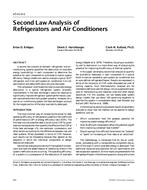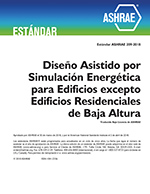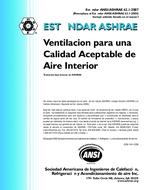Description
A second law analysis of domestic refrigerator and air-conditioning systems quantifies the destruction of available energy (availability) in each component to determine the potential for each component to contribute to overall system efficiency. Design models are used to analyze a typical 18 ft 3 refrigerator and 3 ton split-system air conditioner. Fan-coil optimization and dehumidification are also discussed. The compressor contributes the most to available energy destruction in a typical refrigerator system. Dramatic improvements in the heat exchangers would be required to significantly improve refrigerator system performance; cabi-net improvements hold much greater potential. However, for a typical air-conditioning system, the heat exchangers account for the largest portion of the total availability destroyed.
Units: I-P
Citation: Symposium Papers, Atlanta, GA, 2001
Product Details
- Published:
- 2001
- Number of Pages:
- 8
- File Size:
- 1 file , 340 KB
- Product Code(s):
- D-7171




